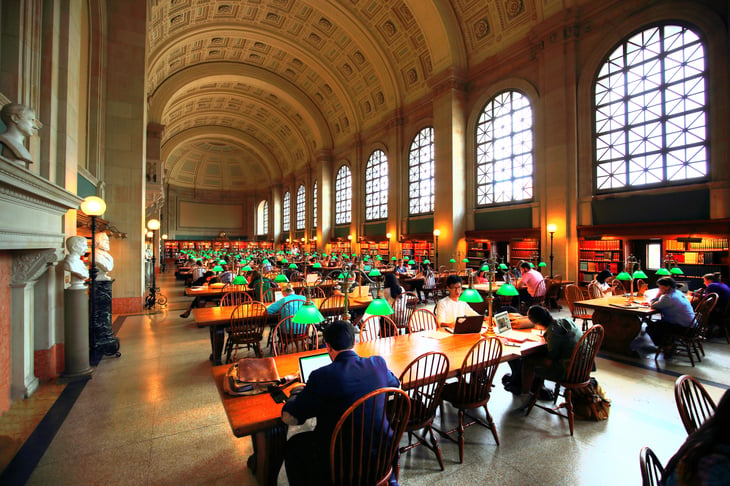
Editor's Note: This story originally appeared on Living on the Cheap.
When I think of the word “simplify,” I am reminded of Henry David Thoreau’s famous directive to “Simplify, simplify!”
Thoreau carried his belief in simplifying to what most of us would consider an extreme in today’s world. He chose to live alone in a cabin in the woods, off the grid (not that there was much of a grid back in 1854) for more than two years.
His goal: To distill life down to its essence — devoid of distractions — so that he might discern what really matters and live authentically.
Even those of us who are thoroughly committed to the concept of simplifying are unlikely (and likely unable) to take a Thoreau-esque sabbatical from our real lives to “find ourselves.” Others among us just want to make a few calming changes to our hectic lifestyles — not ponder our very existence, or take a year or two to define the meaning of life.
If you’re ready to simplify, but don’t know where or how to start, we break it down into a simple three-step process. Your journey starts now.
Part one: Soul searching

Thoreau’s rustic, unadorned, prolonged interlude in the woods isn’t the only way to determine how “simple” you are — or want to be. But anyone can (and really should!) do some soul searching.
If done with the true intent of discerning what Thoreau described as the “essential facts of life,” your efforts to search your soul could improve the balance of your life immensely by helping you live genuinely — or you could be blessedly reassured that you are, indeed, living an authentic life, one that dovetails with your values and beliefs.
You can do this by setting aside a few hours of uninterrupted quiet (think of it as your mini-Walden experience).
First, you might want to read a little — or a lot! — on the subject.
Ultimately, you’ll want to answer — truthfully and after considerable deliberation — a few basic questions (writing down your answers in great, even painful, detail is essential). Here are the questions you’ll need to ask:
- How do you define success? You might want to tackle this question from a different angle and ask “How would you define a life lived with no regrets?” How would you spend your time? How would your life be different?
- What do you think our purpose is here on earth? As author/environmentalist Wendell Berry asks in one of his essays, “What are people for?”
- What matters to you most? What do you hold sacred? When do you feel most at peace? What brings you the most fulfillment?
- What characteristics do you value in your friends and family?
- What makes you happy? What activities give you the greatest joy?
After answering these questions you will begin to see some patterns developing. Most of us will discover that we very much value people over stuff.
We cherish time — with friends and family, with nature, with ourselves, with a good book — over an 80-hour workweek, a McMansion, and an $80,000 car.
If you find that your answers lean this non-materialistic way, you are, indeed, a candidate for simplifying. Simplifying — removing the clutter, getting off the work-spend-work treadmill, giving yourself time — will ultimately allow you to live your values.
And isn’t that what life is all about?
Part two: Simplifying baby steps

It is very (very!) helpful to perform the soul searching described in part one as you start on your path to a simplified life. But it’s not an absolute necessity that you engage in that “examination of conscience” before you take steps to simplify.
The idea of simplifying — slowing down, feeling more calm and peace in your life, smelling more of those roses — may just be appealing to you.
You may know intuitively, with very little reflection at all, that you are not thriving in your current life situation, be it your soul-sapping job, your over-extended social life, your month-to-month-paycheck lifestyle, your attempts to take on too much.
So you may just be ready to jump on the Simplicity Bandwagon. That’s fine. I would only caution you here that if some of the simplifying tactics become difficult — and they well might — having that soul searching session and its epiphanies under your belt can help you to persevere. Just a thought.
The following simplicity tactics are not really life-changing on their face. Indeed, they may sound very easy to implement — and hopefully they will be just that for you.
But some of these seemingly straightforward ideas may diverge significantly from your current routine. If you have a partner and/or kids, they may require a family meeting to actually implement.
Turn off ‘devices’ during meals (and other times, too)

Several years ago, I was visiting one of my sons at college. We went out to dinne,r and as we were being seated we walked by a table of six other college students. Every one of them was scrolling through their phones, texting, Facebooking, etc.
I almost laughed out loud — except, truly, it wasn’t funny. It was sad. Here was this group of young people, paying good money to go out to eat together, and they were all communicating with someone or something else.
So this is my first Simplifying Baby Step: Turn off your phones (iPads, tablets) during meals. And, further, during visits with other people.
If this sounds radical, ponder this thought: What did we all do before cellphones? We paid attention to those we were with. Not to sound too dramatic, but isn’t that the essence of being human?
Kill your TV

Say what? I’m quite serious about this: really consider killing your TV (or at least your cable service). At a minimum cut way back on your viewing.
If you do decide to continue watching television, at least try to understand what you’re watching, especially if you have young children. “Deconstructing” TV ads and the shows themselves — asking questions like “who is the audience for this product?” and “how can a bottle of soda make you cool?” or “does that house look a little too perfect?” — is both educational and fun.
Remember this basic rule: Most advertising is aimed at getting you to feel bad about yourself, to feel that you are “less than” without the product being advertised.
Walk or bike

This step will be immensely easier for those of us who live in “walkable” neighborhoods. But it’s something to aspire to even in the ‘burbs. You’ll see your neighborhood differently and get exercise in the process.
Use your library

You’re already paying for your local library. Use it. Download e-books through the library’s online system.
Don’t forget all of those beyond-books-extras. From DVDs to free computer access to numerous classes and workshops. And whoever came up with the divine ability to place holds on books should be canonized.
Hug your people

You have an inner circle of people who need you. This is especially true if you have young children. There’s nothing wrong with taking time away from schedules and hanging out with the family, eating pizza, and playing board games.
Part three: The big picture

The simplifying steps that can ultimately result in big life changes, like retiring early or working part-time, traveling, living abroad and beyond, take some effort.
The bottom line here is that when you’ve truly simplified, you will find that you have a heckuva lot more time and freedom. You may be able to do everything on your bucket list now (or very soon).
Here are some big-picture life adjustments that can lead you to simplicity.
Get your financial house in order

What do I mean by this? I mean taking control of how you earn and spend money. And what does this have to do with simplifying? Almost everything, as it turns out.
When most of us think of The Rat Race, it’s the frenetic grind of a work-spend-work treadmill that comes to mind. It’s slaving away 40-plus hours a week and living paycheck to paycheck, never saving, never getting ahead.
It. Does. Not. Have. To. Be. This. Way.
There are countless excellent resources to help you get your financial life in order. When you’ve done that, opportunities will surface that you didn’t know were there.
You’ll be able to save toward that down payment for the house you’re hoping to own. Or just pay off those college loans. You may discover that you can work from home a couple of days a week.
Eventually, you may even be able to work part-time. Ultimately, you could retire early.
My favorite book to start with — and, truly, END with — on any financial simplification path is “Your Money or Your Life” by Joe Dominguez and Vicki Robin. It’s a comprehensive blueprint to help you really figure out what your relationship with money is, and it can guide you to financial independence.
You will have to make changes, but they may be a lot less painful than you could imagine. And the pros will far outweigh the cons. Give it a try!
Quit trying to keep up with the Joneses

This wisdom applies to darn near everything. Cars (repeat after me: “Cars are transport pods, not status symbols”), houses (bigger is not better), furniture, granite counters and stainless steel appliances in your kitchen, clothing (jeans and T-shirts work in most situations!). The list goes on and on.
When you say “no” to the latest consumer trends and figure out how to be yourself, you will save tons of money.
Reduce, reuse

I have a small plaque of a Depression-era sentiment: “Use it up, wear it out, make it do, do without.” Those times were, clearly, a period of involuntary simplicity, but the idea is actually one of respect for the earth’s resources. It’s now called Green Living.
Here are examples of each R:
Reduce. In a nutshell, this can be expressed as, “Quit buying stuff.” Shopping — although promoted as America’s national pastime — is not good for you, your pocketbook, or the earth. We don’t need closets the size of small houses. More stuff just means more dusting, cleaning, storing, insuring, worrying.
Reuse. Here’s one simple example of reusing: My older sister has two sons. When I gave birth to two sons a few years after she did, I became the lucky recipient of all of the clothing (and many toys and books too) that her boys had used.
There are now many organized efforts to reuse stuff — and create community in the process! The Buy Nothing Project is one example of a group (with branches all over the world) that will happily help you in your efforts to downshift.
So think twice about buying more things. Or “updating” or “upselling” — like buying a bigger house, a newer car, a remodeled kitchen, the latest gizmo or gadget. And when you do buy, buy used.
Buy local whenever possible

When you DO shop, do it at a local “mom and pop” shop. Your meal will be healthier, likely locally-sourced, and your purchase will stimulate the local economy.
When shopping for food, consider local farmers markets. And, because you have reduced your other purchases significantly, you will be able to afford to buy at local stores when you do need “stuff.”
Don’t deprive yourself!

You can still enjoy those things that truly make you happy. But you need to thoughtfully decide if the time it took you to earn the money you’re spending is worth the joy you get out of that experience or product.
And besides, the best things in life really are free (or nearly free): hanging out with friends and family, laughing, petting your cat or dog, walking around the neighborhood on a crisp spring day, singing in the shower …
The above Big Picture ideas will get you started toward a more authentic, less stress-filled simple life. You can find a host of other tips and inspiration on this website — and from the resources listed below. Get started — and enjoy your simplifying journey!





Add a Comment
Our Policy: We welcome relevant and respectful comments in order to foster healthy and informative discussions. All other comments may be removed. Comments with links are automatically held for moderation.